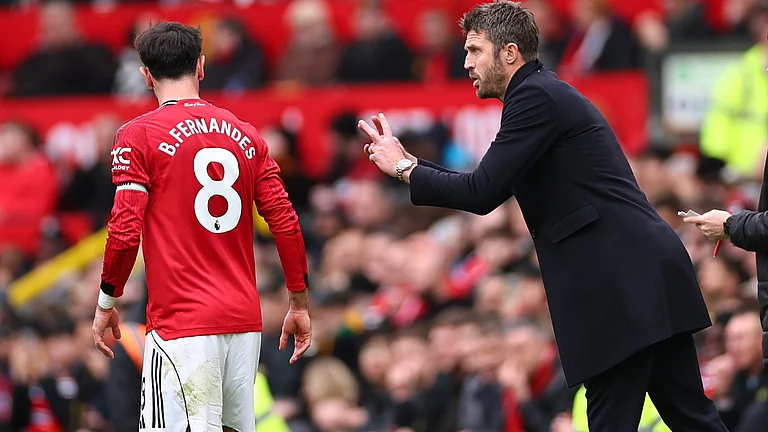Prime Minister Narendra Modi visited the United Arab Emirates (UAE) on 28 June 2022 and paid his personal condolences on the passing away of H.H. Sheikh Khalifa bin Zayed Al Nahyan, the former UAE President and Abu Dhabi Ruler. PM Modi also took the opportunity to congratulate H.H. Sheikh Mohamed bin Zayed Al Nahyan, on his election as the new President of UAE and Ruler of Abu Dhabi. In a special gesture, Mohamed bin Zayed, accompanied by senior members of the Royal family, received Modi at the Abu Dhabi presidential airport. Coinciding with the completion of 8 years of Modi in office, the visit is an opportune moment to review how India’s relations with the Arab-Gulf have scaled new heights under PM Modi.
In the past 8 years, PM Modi’s personal imprint has been the fulcrum of India’s flourishing relations with the Arab-Gulf. The renewed vigour of the ties is rooted in the 5 pillars of Narendra Modi’s foreign policy: Sammaan—respect for nation’s sovereignty; Samvaad—greater engagement; Suraksha—security; Samriddhi—shared prosperity; Sanskriti and Sabhyata—instilling a culture that world is one family. These pillars reinforce rich traditions of India’s centuries-old civilizational relations with the Gulf region—stretching back to almost 5,000 years which can be traced to trade linkages between the civilisations of Indus Valley and the Dilmun (encompassing Kuwait, Bahrain and Eastern Saudi Arabia). All along, these relations were based not on the tenets of religion, but on civilizational philosophy, trade, shared prosperity and mutual trust.
PM Modi has invested more energy and commitment in cultivating ties with the Arab-Gulf than any of his predecessors. This has led to India being accorded unprecedented levels of respect and importance in the region. The geopolitical churn and socio-economic challenges in the region have also contributed to creating a ground for India’s enhanced role. Over the years, the US has gradually shifted its gaze away from the region. This is as much due to the security imbroglio in the region as it is due to its decreased dependence on the region for its energy needs. Today it no longer enjoys the trust in the region in the way it used to. This void has set the stage for new players to play a more proactive role in the region. Against this backdrop, India, for the first time, is being seen as a credible role player in the promotion of regional peace and security in the region.
A key success of Modi’s foreign policy has been the ability to navigate relationships with the Arab-Gulf countries across binaries. Modi vigorously cultivated relations with countries like Qatar, UAE, Saudi Arabia, Bahrain, Jordan and others, while at the same time assuring them that India’s quest for taking ties with Israel to the next level will not be at their cost. With Saudi Arabia and UAE moving towards some semblance of normalisation with Israel, the fault lines have been softened. It was indeed an acknowledgement of India’s growing weight in the region when a few months back the Palestinian Prime Minister Dr Mohammad Shtayyeh during his meeting with PM Modi sought India’s ‘well-established and distinguished’ role in the region. PM Modi also holds the distinction of becoming the first Indian PM to visit Palestine and receive its highest civilian award in recognition of his key contribution to promoting relations between India and Palestine. For a Muslim minority India to be looked upon as an effective interlocutor in a conservative Muslim-dominated region heralds a transformation in the outlook of these countries for which the credit goes to PM Modi.
What has endeared the Arab-Gulf countries to India has been the fact that while India recognizes and supports the Gulf region in its efforts to counter emerging security threats, India’s approach has been non-intrusive and nonpartisan in intra-regional disputes.
PM Modi has also repeatedly underscored that the Gulf countries are India’s ‘maritime neighbours’. Through this description, he has undertaken a reorientation of India’s neighbourhood policy whereby ‘neighbourhood by the sea’ is accorded equal weightage with ‘neighbourhood by land’. This policy also stresses on the importance of ‘shared values’ rather than mere ‘geographical distance’ for defining a neighbour.
In his 8 years in office, Modi has paid visits to UAE in 2015, 2018, 2019 and 2022, Saudi Arabia in 2016 and 2019, Bahrain in 2019, Oman, Jordan and Palestine in 2018 and Qatar in 2016. Modi also visited the Sheikh Zayed Grand Mosque in UAE in 2015 and Sultan Qaboos Grand Mosque in Oman in 2018. His visits have been fully reciprocated by the Gulf monarchs to India in these 8 years. As a mark of personal goodwill for the Prime Minister, Saudi Arabia, UAE and Bahrain have conferred their highest civilian awards on him.
The impetus on India-Arab relations has a clear focus on national and regional interests. Around 9 million Indians (30% of overseas Indians) reside in the Gulf region. Indians constitute the largest expatriate community in everyGulf country and are the majority in three—UAE, Qatar and Bahrain. Indian diaspora in the Gulf contributes around 57% of India’s total overseas remittance. UAE and Saudi Arabia are among India’s top 5 importers, with the whole gulf region accounting for 17% of India’s total imports. The region also accounts for more than two-thirds of India’s crude oil supplies. From being once restricted to simple trade-economic relations, during the past 8 years, they have metamorphosed into strategic areas of defence cooperation, counter-terrorism, cyber-security, organised crime and piracy. This has raised India’s stake in the security and stability of the region.
Prime Minister Modi’s Arab-Gulf policy has set new benchmarks in India’s foreign policy history. The expanding arc of India-Arab Gulf relations will be central to heralding the era of an Asian century.
(The author is Vice-Chancellor, Aligarh Muslim University, India)





















